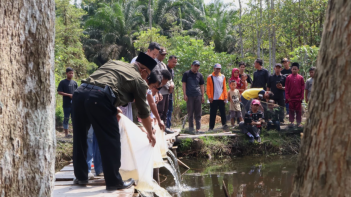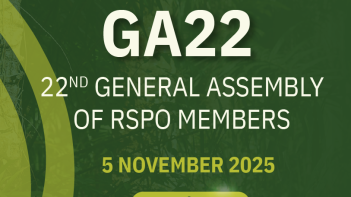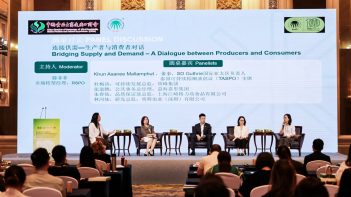Master Trainers from the RSPO Smallholder Trainer Academy (STA) have been putting a lot of effort into designing their training programmes to reach more small-scale farmers globally, and to guide them towards adopting sustainable agricultural practices.
RSPO’s Livelihood Programme Manager, Kertijah Abdul Kadir said, “Using interesting and creative approaches to engage with smallholders has proven vital to ensuring that the knowledge shared can be easily understood and adopted in their respective farms.”
Master Trainers from the Procter & Gamble (P&G) – Malaysia Institute for Supply Chain Innovation (MISI) partnership, for instance, incorporated a fun learning approach in their training by using LEGO blocks to project the idea of farm mapping to smallholders. They said that smallholders were able to better understand the layout of their farms through the display of these objects, compared to other means.
Sowu Avogbedoh, a Master Trainer from Norpalm Ghana Limited (previously with SIAT Group), also shared that his training materials are often simplified and translated into the smallholders’ local language so that they are able to grasp concepts more easily. “I often incorporate pictorial references in my training materials to more easily convey the delivery of my training,” he said.
Partner organisations, such as Forever Sabah, took the initiative of maintaining contact with the group leaders of the smallholders after their training sessions, to ensure they are able to extend their knowledge to their respective group members. Two weeks prior to the training, group leaders also need to familiarise themselves with the content so that this prior knowledge builds their confidence during sharing sessions with their respective groups.
Although planning a training session may look simple, there are many aspects to consider. Master Trainers shared that at times, they have to travel as far as 250 km to conduct a training session. Furthermore, Master Trainers often need to take into account transportation issues for smallholders to travel to the training venue, as most of them do not have their own mode of transport.
Other issues such as setting a date and time for training can also be challenging, as most smallholders are not available during weekdays as they need to tend their farms. To enable more smallholders to participate in the training, many Master Trainers conduct their training over the weekend.
As of October 2020, a total of 1,028 smallholders have attended training organised by STA Master Trainers. The STA is also pleased to share that this figure includes 313 female participants, supporting the United Nations Sustainable Development Goals to promote gender equality.
The Master Trainers shared that most of the smallholders appreciate the guidance provided at the training. Even basic information such as collecting loose palm fruit is deemed valuable to the smallholders, as they were not aware of the profit that can be generated from loose fruits.
Some potential group members in Mexico have also expressed their interest to be trained more on internal control systems and Best Management Practices (BMPs) in social, environmental and agricultural practices. However, due to the current COVID-19 pandemic, the number of training sessions have reduced in certain regions.
The RSPO Secretariat would like to congratulate all Master Trainers and smallholders who have been involved in a successful first year of the STA’s establishment! We are eager to see this initiative support more smallholders with sustainable cultivation practices that help enhance their livelihoods. For more information, visit www.sta.rspo.org/
Keep reading

Rowo Ombo: From Neglected Swamp to a Symbol of Hope and Conservation in Jambi, Indonesia

Save the Date: The 22nd General Assembly (GA22) of RSPO Members

Access into prisma

10 Years of RSPO in China: Driving Palm Oil Transformation Towards Sustainability

Updated Trace Function in prisma

Call for Expression of Interest: Independent Investigation of a Complaint

Latin American Smallholders, Key Global Brands Gather in Peruvian Amazon to Advance Sustainable Palm Oil

RSPO Forum for Members and Certification Bodies 2025: Strengthening Capacities and Building Bridges with RSPO Members




